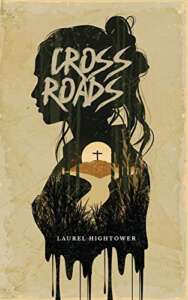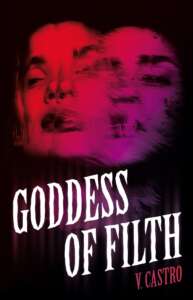Voice to Books: Horror Screams Our Truth
When most people think of horror, they may think of Stephen King or the bloody slasher movies from the ’80s. While these movies and books have made a lasting impression on the genre, they are often dominated by a straight white male view—demonizing and objectifying not only marginalized communities but cis het white women as well. But horror has many authors and storylines to share with readers beyond the straight white male. From those stories, horror is used to reflect on and discuss sensitive social and cultural issues. These reviews highlight women—POC and white—and their personal horrors that are intensified by the supernatural.

 Moon Child by Gaby Triana
Moon Child by Gaby Triana
Reviewed by Kathryn E. McGee
Gaby Triana writes a haunting story of self-discovery in her novel, Moon Child, which focuses on Valencia—Vale to her friends—a Cuban-American teen on the cusp of adulthood. Vale’s character is grounded in the questioning of her Catholic upbringing and desire to carve her own path in the world. Engaging in witchy practices her family considers evil, she is challenged to accept her true self.
When we meet Vale, she abruptly leaves a church retreat to visit her half-sister in rural Florida where she is drawn to an old tuberculosis sanitorium laden with ghosts and decay. Despite the building’s structural deficiencies, the former hospital is revealed as an important hub of spiritual energy. It is here Vale makes new friends with psychic abilities and her own powers begin to emerge.
Triana weaves in a deftly plotted backstory about the hospital’s blood-soaked history as well as chilling hauntings that unravel mysteries of Vale’s own family. The result is a gothic story with setting inextricably linked to character, allowing Vale to confront issues of loss and grief. Magical elements, such as the appearance of a mystical wolf and ghostly visions, facilitate her search for identity and connection to a new way of being.
Moon Child is a well-plotted, beautifully written story with a strong protagonist who gives permission to question the status quo. The notion that one can access their highest and best self when open and willing is a concept that would appeal to readers of all ages. This is where the magic of the book lies: in making the world feel ripe with possibility.

Children of Chicago by Cynthia Pelayo
Reviewed by S. Faxon
Children of Chicago by Cynthia Pelayo is a recommended read with intriguing descriptions that hook readers from the start. Readers are transported to the streets of Chicago alongside a detective with many shadows in her past—shadows that, in their dark way, are trying to tell her that something wicked is coming. Detective Lauren Medina, one of the main characters, represents the tortured detective who, as Pelayo writes, serves “as the eyes and the voice of the dead, walking with her victims and Father Death, to find their killers.”
Medina is constantly fighting not only the dead but for herself as she struggles to establish herself as an officer on the force who is respected by both the community and her fellow officers. As the story moves on, readers may start to wonder if she is fighting to maintain her sanity from all the trauma in her life or if the ghosts are truly appearing before her. This story is not for the faint of heart, but if you like paranormal stories or stories that keep you up at night, this one is for you.
Pelayo deftly weaves in a nod to Grimm Brothers fairy tales. Like in the Grimm tales, the lessons of the dangers of temptation ring clear. In this tale, the children of Chicago are being murdered for no apparent reason, but Detective Medina knows that there are darker forces at play, which begin to unfold as she uses her understanding of children’s stories to decipher the clues of the case.
What audiences may love about this book is that it isn’t just entertaining; readers also learn a lot about Chicago and fairy tales, which may even inspire them to pick up the Grimm tales once again. This fantastic journey through what feels like very real criminal activity will keep you captivated to the end.
 Crossroads by Laurel Hightower
Crossroads by Laurel Hightower
Reviewed by Megan Eccles
Laurel Hightower does not shy away from emotional turmoil and even leans into body horror in her novella, Crossroads, from Off Limits Press. This book is a painful, visceral read that explores the horror of motherhood and grief. Hightower’s hauntingly beautiful prose is juxtaposed with the graphic and intense nature body horror as Chris makes sacrifices for her son, Trey, two years after his accidental and tragic death. Blood has a way of calling on things from the dark, and she quickly realizes that she can keep seeing him as long as she’s willing to give up more and more—a price she’s willing to pay.
The story is well paced and wholly unputdownable. Each of the characters is well rendered. Chris is especially complex. Even without the hungry earth at the crossroads and the thing that might be Trey underneath the streetlamp, Hightower escalates each sacrifice to show Chris’ desperate and unrelenting love for her child. Grief doesn’t shrink. It stays inside of you, until you figure out how to grow around it. Chris is all grief. There is nothing inside her but love for her son.
Crossroads is a stunning book that will stay with you long after that last, gripping page. It gets under your skin—perhaps worse for those who are parents. Hightower conveys the horror of child loss with a sense of dread as Chris makes each new sacrifice. You might be sorry you read this book, but you won’t regret it.

Goddess of Filth by V. Castro
Reviewed by A.E. Santana
This novella by acclaimed author V. Castro puts a spin on the possession story through plot, character, and theme. The supernatural in this book is not necessarily centered on Catholic or other Christian teachings, but the Catholic influence does rear an ugly head as young Latinx women do their best to match wills and wits with a powerful indigenous entity. Who the good guys and bad guys are is flipped in a satisfying way, especially for readers who are bored with old-fashioned savior tropes seen in many possession stories.
The main protagonists—a group of Latina teens on the cusp of adulthood—must comprehend the frightening entity that has taken residence within one of them. They do this while also dealing with the trials of life after high school, including oppressive social, cultural, familial, and religious structures. Castro plays with character and theme, crafting a fresh perspective out of tired ideas about which roles women, especially women of color, are delegated in horror literature. Each of the characters help to highlight a theme or archetype. With Fernanda, the reader is witness to a beautiful and empowering sexual awakening and coming-of-age story. With Lourdes, the classic hero is given a contemporary and diverse update. With Perla, Ana, and Pauline, the reader sees a side of feminine companionship based on loyalty and love, a refreshing contrast to the catty, jealous frenemies and mean girl tropes.
The adults surrounding the girls signify either an obstacle or an advantage, hindering or helping the friends as they navigate everyday life and unexplained situations. Characters that readers might imagine would support our protagonists, blame or shun them, while assistance and comfort come from surprising avenues.
A terrifying tale of the evils of established society, the novella is also a story of growth and friendship. Horror fans of possession stories, indigenous and Latin folklore, and diverse and powerful female characters will find Goddess of Filth a spooky and satisfying read.
Voice to Books is a monthly short list of reviews from a variety of voices, curated by Daniela Z. Montes and A.E. Santana. Like the authors and their characters, each of our reviewers comes from a marginalized or underrepresented group. Interested in contributing a review to Voice to Books? Please send inquiries to voicetobooks@gmail.com.
